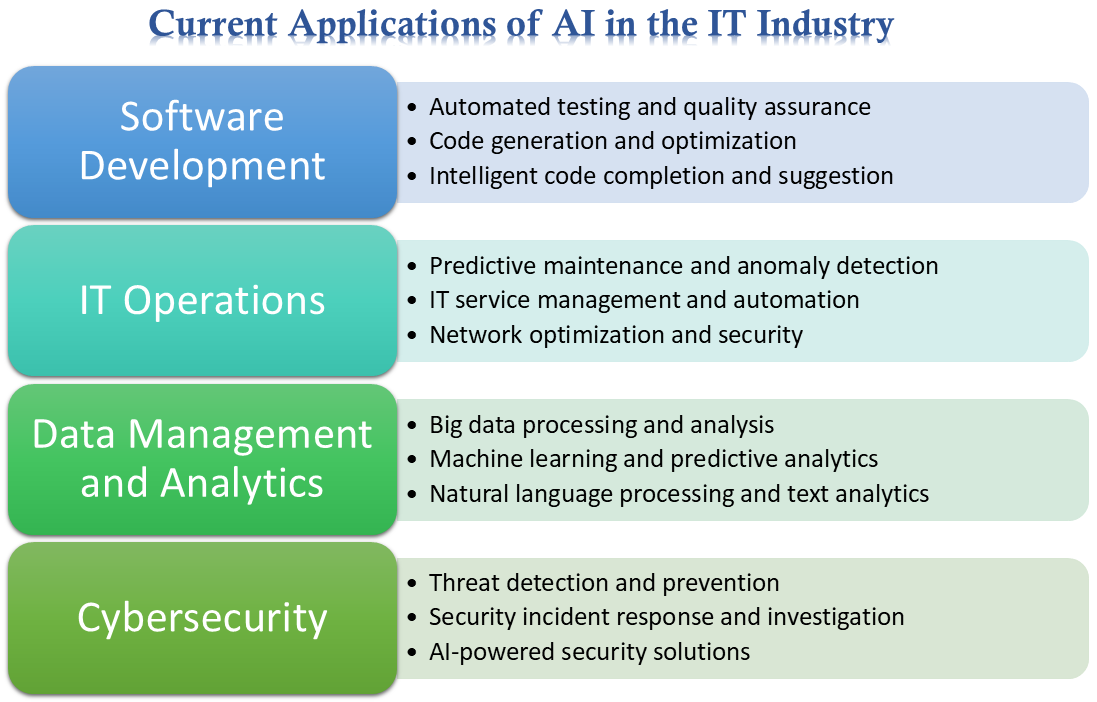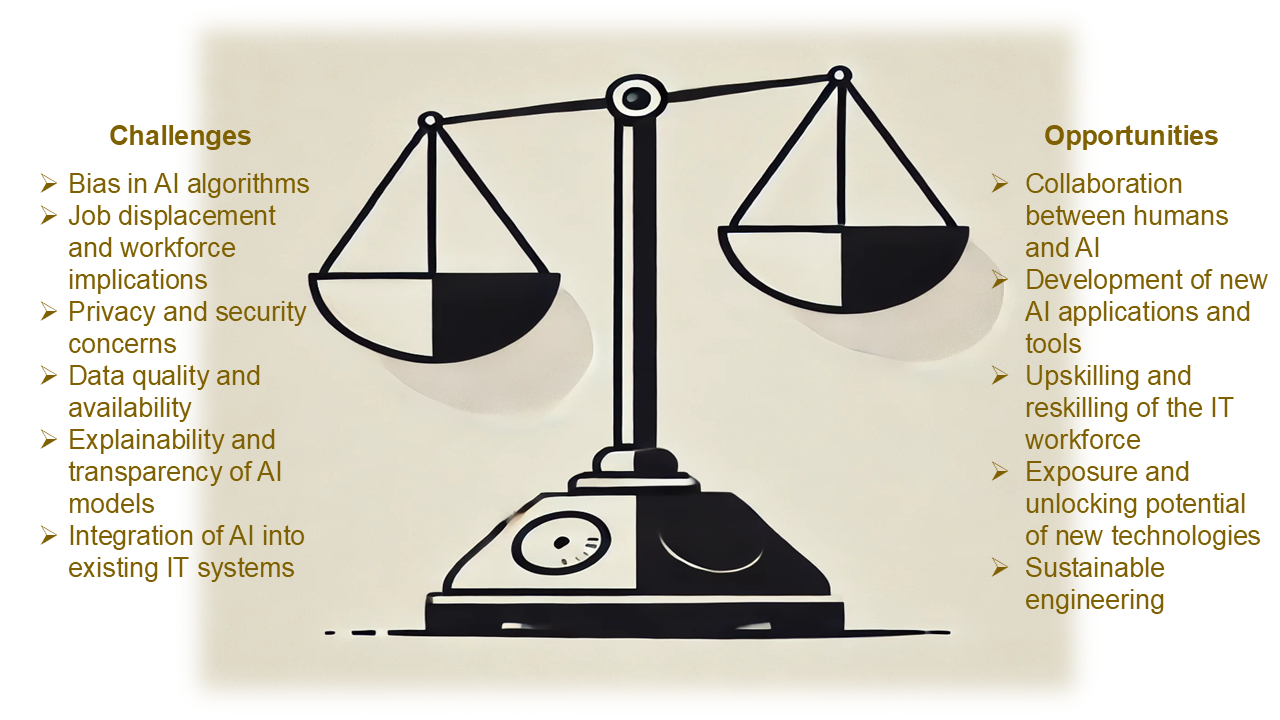Impact of AI on Engineering: What the Future Holds for Engineers
|
|
Artificial intelligence, once a domain of science fiction, is now a cornerstone of the IT industry. From automating mundane tasks to revolutionizing data analysis and decision-making, AI is reshaping how we work and live. As AI advances at an unprecedented pace, IT professionals must adapt or risk being left behind.
Let’s look at where we are with AI today and where our path is headed.
Importance of AI in Engineering
With AI knocking at the doorstep, it is important to understand why this technology is being given such importance.
- Staying competitive: As AI technologies become more integrated into IT processes, organizations that use AI can outperform their competitors. Understanding AI’s capabilities allows engineers and businesses to innovate faster, improve efficiency, and deliver superior products and services.
- Adapting to rapid changes: The IT arena is constantly evolving, with AI leading the charge. Engineers must understand these changes to adjust their skills and methodologies to ensure they remain relevant in a rapidly shifting environment.
- Enhancing decision-making: AI systems can analyze vast amounts of data to provide insights that inform strategic decisions. Understanding how AI can enhance decision-making helps engineers utilize data effectively and leads to better project outcomes and resource management.
- Promoting innovation: AI catalyzes innovation and enables engineers to explore new possibilities in design, development, and testing. By understanding AI’s potential, engineers can push the boundaries of what is possible and drive technological advancements.
- Navigating ethical and social implications: AI’s rise brings ethical considerations, including data privacy, bias, and job displacement. Understanding these implications helps engineers design responsible AI systems that adhere to ethical standards, ensuring societal trust in technology.
Current Applications of AI in IT
Before we look at the future, we must understand where we are at in the present day.

AI in software development
-
Automated code generation and assistance: AI tools now assist developers by generating code snippets, suggesting improvements, or even writing entire functions based on the developer’s intent. These tools leverage natural language processing (NLP) and machine learning (ML) to understand code context.Example: GitHub Copilot, developed by GitHub and OpenAI, uses AI to suggest code completions in real-time, which helps developers write code faster and with fewer errors.
-
Testing and quality assurance: AI enhances testing processes by automating test case generation, execution, and maintenance. AI-driven testing tools can identify patterns in application behavior and predict where bugs are likely to occur.Example: Facebook uses an AI-driven testing framework called Sapienz, which automatically generates tests based on user behavior and interactions.
- Bug detection and resolution: Machine learning algorithms analyze historical bug data to predict potential vulnerabilities in new code.
-
Project management and resource allocation: AI can optimize project management by analyzing past project data to predict timelines, resource needs, and potential risks. This enables teams to allocate resources more effectively and manage workloads.Example: Atlassian’s Jira incorporates AI capabilities to assist teams in managing projects more efficiently by predicting bottlenecks and offering insights based on historical data.
-
Natural Language Processing (NLP) for documentation: AI-powered tools can automatically generate and update documentation based on code changes. This helps maintain accurate records without manual effort.Example: Grammarly uses AI to assist software developers in writing clear and concise documentation by providing real-time grammar and style suggestions.
-
Continuous Integration and Continuous Deployment (CI/CD): AI enhances CI/CD pipelines by automating deployment processes, monitoring application performance, and predicting failures. This ensures faster releases and minimizes downtime.Example: Microsoft Azure DevOps utilizes AI to optimize CI/CD processes which provides insights into deployment success rates and potential issues based on historical data.
-
User Experience (UX) personalization: AI can analyze user behavior and preferences to tailor software applications for individual users which improves overall user experience and satisfaction.Example: Netflix employs AI algorithms to analyze user viewing habits and preferences, resulting in personalized content recommendations that enhance user engagement.
AI in IT operations
-
Predictive analytics for incident management: AI can analyze historical data to predict potential IT incidents before they occur. By identifying patterns and trends, AI enables teams to take preventive measures which reduces downtime and service disruptions.Example: IBM Watson AIOps uses machine learning to analyze logs and metrics, helping organizations predict outages and respond to incidents proactively.
-
Automated IT service management: AI-driven chatbots and virtual assistants can handle routine IT service requests such as password resets or ticket status inquiries. This allows IT staff to focus on more complex issues.Example: ServiceNow employs AI in its Virtual Agent feature, which provides automated responses to common IT service requests.
- Anomaly detection and security monitoring: AI algorithms can monitor network traffic and user behavior in real-time and identify unusual patterns that may indicate security threats or breaches. This proactive approach helps organizations enhance their security posture.
- Performance optimization: AI can continuously monitor application and system performance, identify improvement areas, and automatically apply optimizations to enhance efficiency.
-
Infrastructure management: AI tools can automate the management of IT infrastructure, including server provisioning, configuration, and monitoring. This reduces manual intervention and the risk of human error.Example: VMware employs AI in its vRealize Operations platform, automating infrastructure management tasks and providing predictive insights for maintaining optimal performance.
AI in data management and analytics
- Data cleaning and preparation: AI algorithms can automatically clean and preprocess data by identifying inconsistencies, missing values, and outliers. This significantly reduces the time spent on data preparation which allows analysts to focus on analysis.
-
Natural Language Processing (NLP) for data querying: NLP technologies enable users to query databases using natural language instead of complex query languages like SQL. This democratizes data access and allows non-technical users to gain insights easily.Example: Google Cloud’s BigQuery allows users to run SQL-like queries using natural language which enables broader access to data analytics capabilities across organizations.
-
Predictive analytics: AI-driven predictive analytics models can analyze historical data to forecast future trends, behaviors, and outcomes. This helps organizations make informed decisions and develop strategies based on data-driven insights.Example: Salesforce Einstein provides predictive analytics capabilities that help sales teams forecast customer behavior and sales trends.
-
Anomaly detection: AI algorithms can monitor data in real-time to identify unusual patterns or outliers, which can indicate fraud, system failures or other significant issues that require immediate attention.Example: PayPal uses AI for real-time anomaly detection to identify fraudulent transactions by analyzing user behavior patterns and transaction history.
AI in cybersecurity
- Threat detection and prevention: AI algorithms can analyze vast amounts of network traffic and user behavior to identify potential threats in real-time. By learning from historical data, AI systems can recognize patterns indicative of malicious activity, enabling proactive threat detection.
-
Incident response automation: AI can automate incident response processes which allows security teams to react swiftly to potential breaches. Automated playbooks can guide responses based on the nature of the threat, significantly reducing response times.Example: IBM Security’s QRadar uses AI to automate responses to detected threats, allowing organizations to contain and mitigate security incidents more effectively.
-
Vulnerability management: AI can assist in identifying and prioritizing vulnerabilities within systems and applications. By analyzing threat intelligence and historical data, AI helps security teams focus on the most critical vulnerabilities that pose significant risks.Example: Qualys uses AI in its vulnerability management platform to automate the discovery of vulnerabilities and provide actionable insights for remediation.
-
Fraud detection: AI algorithms can analyze transactional data to detect fraudulent activity in real time. Organizations can minimize financial losses and secure their operations by identifying unusual patterns and behaviors.Example: PayPal employs AI for fraud detection to analyze transaction data and user behavior to identify and prevent fraudulent transactions before they occur.
-
Network security monitoring: AI can continuously monitor network traffic and communications. This provides real-time insights into potential security incidents. This proactive monitoring helps organizations respond to threats quickly.Example: Cisco’s SecureX integrates AI-driven analytics to provide real-time visibility into network security and helps organizations identify threats and respond effectively.
- Threat intelligence analysis: AI can process vast amounts of threat intelligence data from various sources. It can analyze and correlate information to provide actionable insights. This helps organizations stay ahead of emerging threats.
Future Impact of AI on Engineering
In the future, we will see the applications mentioned above get better. Along with that, we can expect a lot more from AI like:
Enhanced design and innovation
As artificial intelligence (AI) continues to evolve, its influence on engineering practices within the IT industry is expected to increase significantly. One of the most promising areas of impact is enhanced design and innovation.
- Generative design: AI algorithms can generate a vast number of design options based on specific constraints and objectives. It can further identify the most optimal designs based on factors such as performance, cost, and manufacturability. This will help engineers explore design spaces that might not have been considered previously, leading to groundbreaking solutions.
- Personalized product development: AI can analyze customer data and preferences to develop products and services that are highly personalized and meet individual needs. By offering tailored solutions, companies can increase customer satisfaction and loyalty. Personalized products can help companies target specific market segments more effectively, expanding their customer base.
- Accelerated development cycles: AI can automate the prototyping process, allowing engineers to test and refine designs more quickly. By streamlining the design and development process, AI can help companies bring products to market faster. This means optimized design workflows which will reduce the time and resources required to develop new products.
- Complex problem-solving: AI can handle complex engineering problems that would be difficult or impossible for humans to solve alone. It can optimize complex systems, such as power grids or transportation networks, to improve efficiency and performance. By tackling complex problems, AI can thus lead to the development of innovative solutions that address pressing challenges.
Improved efficiency and productivity
AI has already been contributing to this aspect, but as the technology gets better, it will only improve efficiency and productivity.
- Automation of routine tasks: AI can automate repetitive and time-consuming tasks which allows engineers to focus on more strategic and creative work. It can help reduce human errors and ensure consistent quality. By automating tasks, engineers can process more work in less time.
- Predictive maintenance: AI can predict equipment failures before they occur. This will help to reduce downtime and maintenance costs. By anticipating maintenance needs, engineers can schedule maintenance proactively, thus minimizing disruptions.
New engineering roles and skills
It’s not just the technology that is evolving, but also the human workforce. New roles and skills are being brought in to make the most of this evolution. Software engineers who can adapt and acquire new skills will be well-positioned for success in the future.
- AI engineers: AI engineers possess deep knowledge of machine learning, deep learning and other AI technologies. They are responsible for designing, developing and deploying AI-powered solutions. AI engineers must be skilled at solving complex problems using AI techniques.
- Data scientists: Data scientists extract insights from large datasets using statistical and machine learning methods. They work closely with AI engineers to develop AI models and algorithms. Data scientists must have a strong understanding of business objectives to ensure that AI solutions are aligned with organizational goals. Read about big data testing.
- AI ethics specialists: AI ethics specialists are responsible for ensuring that AI systems are developed and deployed ethically. They work to mitigate bias in AI algorithms and ensure that AI systems are fair and equitable. AI ethics specialists address privacy and security concerns related to AI applications. Read more about AI compliance for software.
- AI product managers: AI product managers develop and implement AI strategies for organizations. They oversee the development of AI-powered products and services. AI product managers must have a strong understanding of market trends and customer needs.
Engineering future trends
As AI continues to evolve, we can expect to see several exciting trends emerging in the future.
- Edge AI: Edge AI involves processing data closer to the source rather than relying on centralized cloud computing. It can reduce latency and improve responsiveness which makes it ideal for real-time applications. By processing data locally, edge AI can help protect sensitive information.
- AI-powered automation: AI will continue to drive automation in various aspects of software development. This is mainly because automation can increase efficiency, reduce costs, and improve quality.
- AI-powered autonomous testing: Software testing has become increasingly important for producing high-quality products quickly. However, the process remains relatively manual. Read: Is there a future for manual testing?
AI will be a game changer as it tries to revolutionize this field by introducing autonomous testing; it is not just automated, which is the case right now. We can already see powerful generative AI-based testing tools like testRigor in the market that give you a taste of this. With times to come, autonomy in testing will only increase.
- AI for sustainability: AI can be used to develop sustainable engineering solutions, such as energy-efficient systems, materials, and processes. It can help optimize the use of natural resources and reduce environmental impact. AI can also play a crucial role in addressing climate change by developing innovative solutions to reduce greenhouse gas emissions.
-
Emerging technologies: As engineers get more comfortable with AI, they will be better able to unlock the potential of these technologies:
- Internet of Things (IoT): AI can be combined with IoT to create intelligent systems that can collect and analyze data from connected devices. Here is an IoT automation testing guide.
- Blockchain: AI can be used to secure and verify data in blockchain-based systems to ensure data integrity and privacy.
- Quantum computing: AI can leverage the power of quantum computing to solve complex problems that are currently intractable.
- AI in healthcare: The use of AI in critical sectors like healthcare will continue to rise. AI can assist in medical diagnosis, improving accuracy and efficiency. It can accelerate drug discovery by analyzing vast amounts of data. AI can also enable personalized medicine, tailoring treatments to individual patients. AI can augment human capabilities, letting engineers work more effectively and efficiently. It can assist humans in solving complex problems, thus leveraging the strengths of both humans and machines.

Considerations for AI in Engineering
As engineers, you must grapple with several crucial considerations that will shape the future as AI continues to permeate industries:
Ethical implications
- Bias: AI algorithms can inherit biases present in the data they are trained on, leading to discriminatory outcomes. Engineers must be vigilant in addressing bias and ensuring fairness in AI systems.
- Job displacement: The automation of tasks through AI raises concerns about job displacement. Engineers must consider the potential impact on the workforce and develop strategies for reskilling and upskilling to mitigate these effects.
- Privacy and security: AI systems often handle sensitive data, which raises concerns about privacy and security breaches. Engineers must implement robust measures to protect data and prevent unauthorized access.
Technical challenges
- Data quality: The quality and quantity of data are critical for AI systems to perform effectively. Engineers must ensure data accuracy, completeness, and relevance.
- Explainability: AI models can be complex and opaque, which makes it difficult to understand how they arrive at their decisions. This lack of explainability can hinder trust and acceptance.
- Integration with existing systems: Integrating AI into existing IT infrastructure can be challenging and requires careful planning and consideration of compatibility issues.
Regulatory and legal considerations
- Compliance: Engineers must ensure that AI systems comply with relevant regulations, such as data protection laws and ethical guidelines.
- Liability: Determining liability in AI-related accidents or harm cases can be complex. Engineers must consider legal and ethical implications when developing and deploying AI systems.
Conclusion
AI is no longer a futuristic concept; it’s a present-day reality that’s reshaping the IT industry at a rapid pace. In fact, it is not just contained in the IT industry but also impacts other sectors. Instead of fearing this evolution, you must seek this opportunity to improve yourself. Employ continuous learning to remain competitive and relevant in this AI-driven future.
Additional Resources
- Software Testing for All Industries
- AI Features Testing
- How to Test LLMs?
- Automated Testing in the Automotive Industry: Trends and Challenges
- Automated Testing Best Practices in Highly Regulated Industries
- Applications of Generative AI
- How to Increase Engineering Output Using AI
- How to Align Software Engineering with Business Goals
- How to Become an Engineering Manager
- How to become a CTO?
| Achieve More Than 90% Test Automation | |
| Step by Step Walkthroughs and Help | |
| 14 Day Free Trial, Cancel Anytime |












